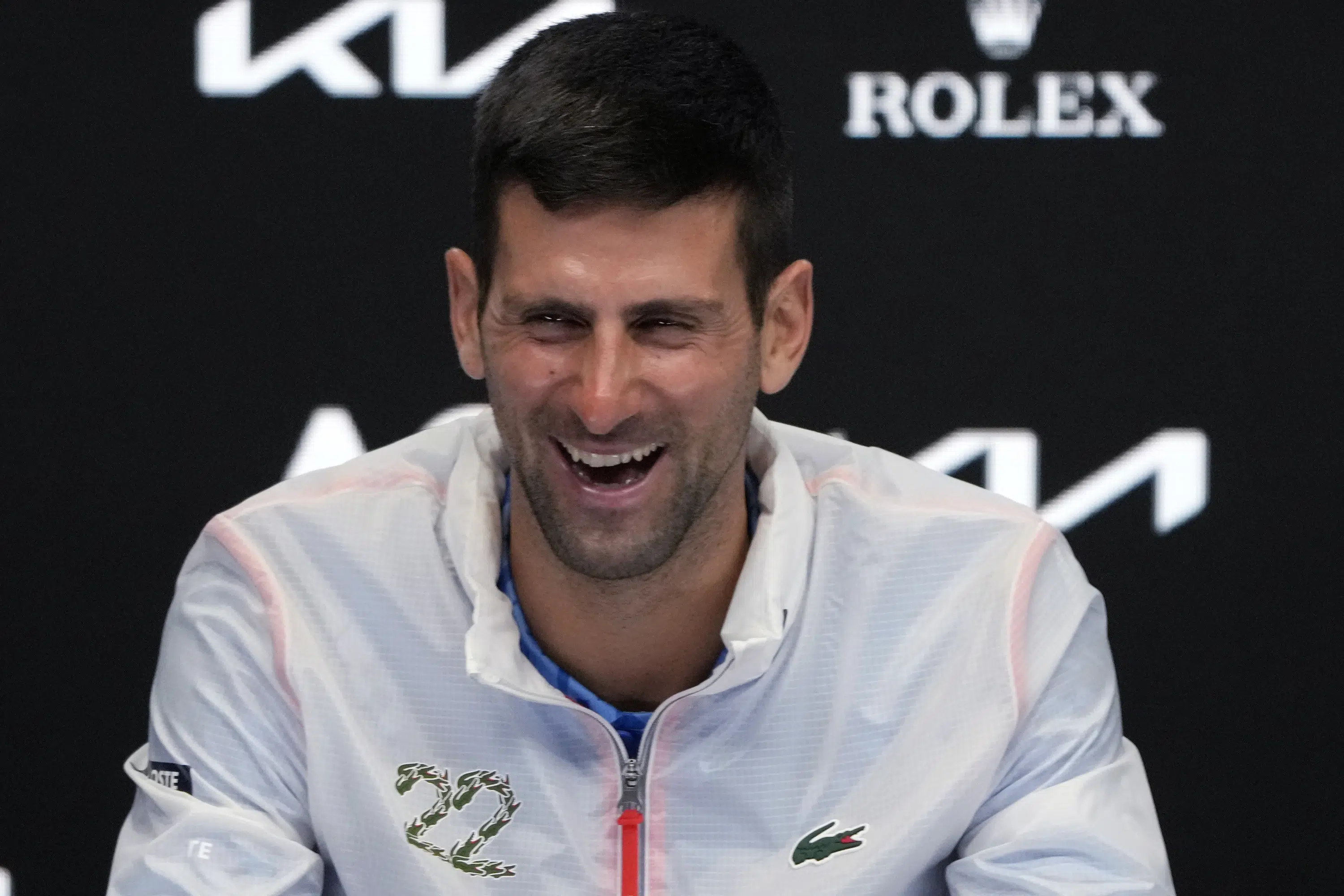Novak Djokovic of Serbia reacts during a press conference following his win over Stefanos Tsitsipas of Greece in the men’s singles final at the Australian Open tennis championship in Melbourne, Australia, early Monday, Jan. 30, 2023. (AP Photo/Dita Alangkara)
Novak Djokovic of Serbia reacts during a press conference following his win over Stefanos Tsitsipas of Greece in the men’s singles final at the Australian Open tennis championship in Melbourne, Australia, early Monday, Jan. 30, 2023. (AP Photo/Dita Alangkara)
MELBOURNE, Australia (AP) — Novak Djokovic clearly is not done dominating his sport.
He says so.
His coach says so.
And, most importantly, his performances throughout a draining run to a record-extending 10th Australian Open championship and record-tying 22nd Grand Slam title, plus his return Monday to No. 1 in the ATP rankings, say so.
His message Sunday night, essentially, was: Look out.
“I still have lots of motivation. Let’s see how far it takes me. I really don’t want to stop here. I don’t have intention to stop here,” the 35-year-old Djokovic said after beating Stefanos Tsitsipas, a man more than a decade his junior, by a 6-3, 7-6 (4), 7-6 (5) score in the final at Melbourne Park. “I feel great about my tennis. I know that when I’m feeling good physically, (and) mentally present, I have a chance to win any Slam against anybody.”
Hard to argue.
Not only has no man won more major trophies ( Rafael Nadal also has 22; Margaret Court, with 24, and Serena Williams, with 23, are the only players in history with more), but Djokovic just keeps applying constant pressure on opponents — regardless of the surface or any apparent obstacles in his way.
ADVERTISEMENT
He returned to Australia with some trepidation, unsure of what sort of reception awaited a year after he was deported for not being vaccinated against COVID-19, and was fine. He dealt with a sore left hamstring, and was fine, dropping one set along the way to the title. He was bothered by the unusual circumstances that kept his father — who had last attended the Australian Open 15 years ago — away from Rod Laver Arena for Djokovic’s semifinal and final, and was fine.
Well, able to bottle all of that up, anyway, until the last point was played. That’s when Djokovic “emotionally collapsed,” as he put it, sobbing in the stadium.
“It required an enormous mental energy, really, to stay present, to stay focused, to take things day by day,” he said, wearing a white zippered jacket with “22” printed on the chest, “and really see how far I can go.”
His strokes are pure as can be. His athleticism, too. His resolve? Off the charts.
“Novak is a player that pushes you to your limits,” is the way Tsitsipas explained it.
He would know. He has lost 10 consecutive matches to Djokovic, two in Grand Slam finals.
ADVERTISEMENT
“I don’t see this as a curse. I don’t see this as something, like, annoying,” Tsitsipas continued. “This is very good for the sport — to have competitors like him, to have champions like him.”
The “GOAT” debate — “Greatest of All-Time” — has consumed tennis fans for years, comparing Djokovic, Nadal and Roger Federer. It’s an OK parlor game, sure, although silly on its merits. All three, it goes without saying, are great.
Federer, 41, is retired. Nadal, 37 in June, left Melbourne with an injured left hip flexor. Djokovic, 36 in May, keeps on keeping on.
For how much longer?
“Definitely two, three more years,” said Goran Ivanisevic, the 2001 Wimbledon champion who has coached Djokovic since 2019. “The way he’s taking care of his body, the way he (approaches) everything, the food, it’s amazing.”
ADVERTISEMENT
Djokovic won’t be pinned down on what he has left. Nor should he. Like Federer, like Nadal, like Williams, he can play as long as he pleases.
Let’s just say Djokovic is not satisfied with what he’s done.
“I don’t know how many more years I’m going to play or how many more Slams I’m going to play. It depends on various things. It doesn’t depend only on my body,” the father of two said, noting that a proper balance with his family life is important to him, too.
As it is, Djokovic won 10 of the last 19 majors — Nadal has a half-dozen of those — and no one collected more after turning 30. There are youngsters to keep at bay, chief among them Carlos Alcaraz, who won the U.S. Open and rose to No. 1 in September at 19 but missed the Australian Open with a leg injury.
Djokovic wasn’t at Flushing Meadows for the same reason he wasn’t at Melbourne Park last year, and the United States, unlike Australia, still is not admitting unvaccinated foreigners.
ADVERTISEMENT
But before that, Djokovic is sure to be the favorite at Roland Garros if Nadal isn’t healthy, and at Wimbledon, which he already has won seven times.
“Physically, I can keep myself fit. Of course, 35 is not 25, even though I want to believe it is,” Djokovic said. “But I still feel there is time ahead of me. Let’s see how far I go.”
___
Howard Fendrich has been the AP’s tennis writer since 2002. Write to him at hfendrich@ap.org or follow him on Twitter at https://twitter.com/HowardFendrich
___
AP tennis: https://apnews.com/hub/tennis and https://twitter.com/AP_Sports


